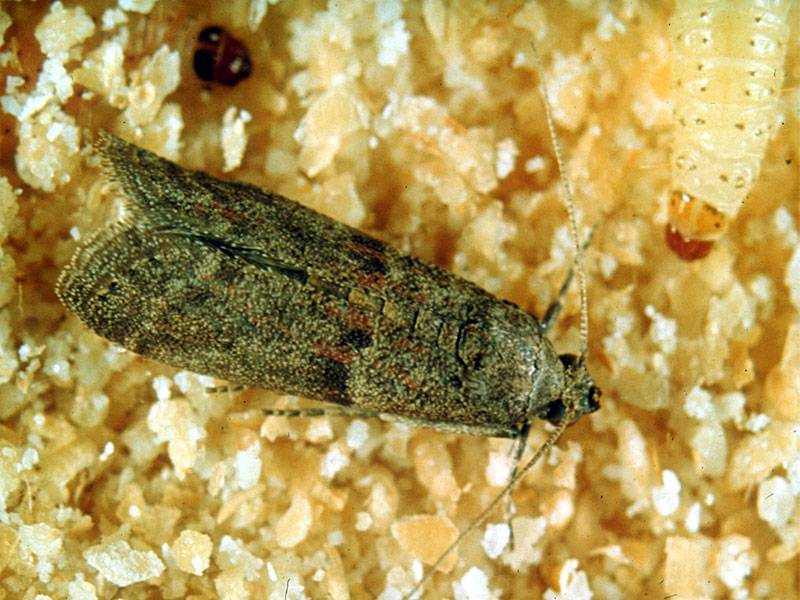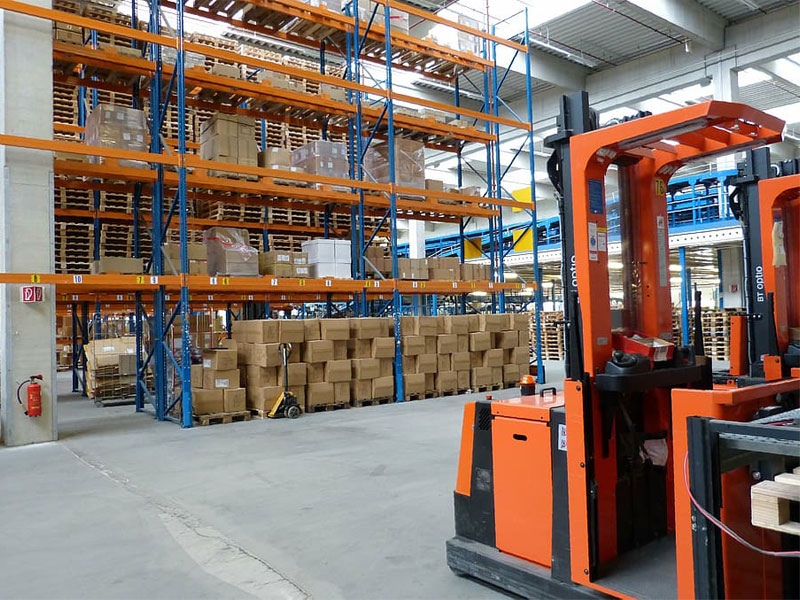Tropical warehouse moth infestation

The Tropical Warehouse moth is a popular stored product pest in tropics and sub-tropics, as well as temperate climate countries, where it survives the winters in heated areas. It infests products like cereals and cereal products, flours, dried fruit and cassava, cocoa beans, mace, cowpeas, oil seeds and oil cakes, etc..
This pest is grey-brown in colour, banded with lighter and darker colours on its wings. Its length is 7 mm to 9 mm at rest and 15 mm to 20 mm with spread wings. Depending on the diet, the larvae of the moth can be off-white, yellowish or reddish colour and have a caterpillar shape. The Warehouse moth is not considered dangerous to people or pets, however the infested products are not suitable to use and should be disposed of. This pest could potentially cause a significant loss of business, in cases of infesting commercial warehouses and storage spaces, industrial plants in food handling and manufacturing.
Tropical warehouse moth control

The Tropical Warehouse moth is controlled in a similar way to the other stored product insects. Good housekeeping in the area where the products are stored and used. Regular cleaning and sanitisation is required. To monitor and control minor infestations pheromone traps can be used, which contain the laboratory replication of the natural moth hormones used for communication between the moths. This attracts the moths to the sticky traps and they remain stuck into it.
If the conditions of the premises allow then carbon dioxide and low oxygen treatments can be used to eradicate the infestation. If these are not suitable then freezing or heating the area can also be done as it will eradicate all life stages of the infestation. Fumigation is also a suitable method for Tropical Warehouse moth infestation eradication and control, as well as spray application of professional-use-only insecticide, specifically developed to tackle stored product moths. Just like the heating and freezing treatments, fumigation or spray application exterminates all life stages of the infestation, although it will not prevent a new infestation from re-introduction. To prevent or reduce the risk of re-introduction, food deliveries and food packages should be thoroughly checked upon receiving, or monitoring programme may be set up.
Prime Pest Control provides Tropical Warehouse pest control services to domestic and commercial customers in North, South, West, East London and the surrounding areas. Our experienced British Pest Control Association (BPCA) trained pest technicians are well-equipped to inspect, risk assess and treat your premises, executing a custom-tailored action plan that works in the long run. Our treatments are always designed with the principals of integrated pest management (IPM) in mind, so that we achieve complete extermination and control with less treatments and money spent.
About Tropical warehouse moth
The Tropical Warehouse moth (Cadra Cautella) infests cereals and cereal products, flours, cocoa, dried fruit, etc… It is most often that the introduction of this moth is with infested raw materials or imported products.
The adult female moth lays up to 300 eggs, which hatch within 3 days to 1 week. The larval period lasts about 30 days and the are five instar stages in total. The larvae are considered the ‘pest’ form of this moth. Usually, pupation happens inside the product, however, in cases of heavier infestations larvae may crawl onto walls and in-between product packs, shelves, etc.. The larval period takes about 22 days, depending on the conditions. It ends with the formation of a cocoon, where the pupation happens and takes about 1 week to complete. The adult emerges from the cocoon in the late afternoon of the day. The total life cycle of the Warehouse moth takes between 29 and 31 days, depending on the conditions.
